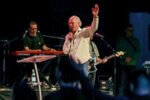In a message he gave at one of our Charisma conferences a few years ago, Mike Bickle asked this question: “Are you a sinner who struggles to love God, or are you a lover of God who struggles with sin?” Bickle, the director of a 24-hour-a-day prayer ministry in Kansas City, Missouri, called the International House of Prayer, posed the question to challenge us to look closely not only at how we view ourselves with relationship to God but also how we believe God perceives us. If we see ourselves as sinners rather than as lovers, it is because we don’t really know what God thinks about us.
Most of us are so aware of our own shortcomings that we have trouble understanding that God loves us and enjoys being with us in spite of them. We think we must achieve some sort of spiritual perfection before we are good enough for God to love us. Yet God loves us very much, and He wants to spend time with us.
Bickle discovered this truth at a point in his life when he considered himself a spiritual failure. He was doing all
the “right” things–praying an hour a day, fasting, memorizing Scripture,
witnessing–but he still felt he
was falling short of God’s
expectations.
One day as he was reading the story of the prodigal son, the verbs that describe the actions of the prodigal’s father when he saw that his son was returning came alive: “‘And he got up and came to his father. But while he was still a long way off, his father saw him, and felt compassion for him, and ran and embraced him, and kissed him'” (Luke 15:20, NASB, emphasis added). Bickle was overwhelmed. In his book, Passion for Jesus, he tells his reaction:
“In the midst of my…failure I had wondered so many times how God felt about me. I’d even dreaded to imagine the expression on His face when He saw me coming back for forgiveness each time I let Him down. Suddenly I knew, for through the prodigal’s father I glimpsed the face and heart of God.
“When God saw me trudging toward His throne with my head bowed in shame, like the prodigal’s father, He was moved with affection and tenderness for me. He was running toward me with joy and excitement. His arms were outstretched, reaching for me, longing to catch me up in His loving embrace and kiss away my guilt and failure.”
Bickle says he realized what we all need to understand: that our God is a God who loves us so much He can’t keep from embracing us. A God who loves our friendship and wants us to be with Him. A God who enjoys us even in our failure and immaturity because He sees the intentions of our hearts. A God we don’t have to strive to make happy because He’s been happy with us from the second we were born into His family. A Father who brags on
us and who
enthusiastically calls us His children.
Is this the way you see God? If not, take a moment to reflect on Jesus’ words to the disciples: “I have loved you even as the Father has loved Me” (John 15:9, NLT).
Wait a second–as the Father loves the Son?
What a thought! What does the First Person of the Trinity feel about the Second Person of the Trinity?
Remember Jesus’ baptism? It was as if the Father looked over the balcony of heaven and proudly proclaimed: “That’s My Boy. I like Him. He’s My Son, and I’m well pleased with Him.” And later, when Jesus was on the mount of transfiguration, the Father declared, “‘This is my beloved Son, and I am fully pleased with Him'” (Matt. 17:5).
Now let’s think about this a minute. Just hours before the disciples would turn their backs on Him, Jesus tells them He loves them as intensely as the Father loves Him. Even though He knows they will fail, He loves them anyway.
Two millennia later, Jesus says the same to us. We deny Him every time we sin, but He still loves us. We are imperfect and immature, but He still loves us. And it is His love toward us that propels us to love Him in return. Our knowledge of how He really feels when He looks at us sets us free to see ourselves not as struggling sinners but as extravagant lovers fully “accepted in the Beloved” (Eph. 1:6, NKJV). *
Stephen Strang is the founding editor of Charisma. His first book, Old
Man New Man, is now available
at Christian bookstores or online at http://book.charismamag.com.






Leave a Comment
You must be logged in to post a comment.